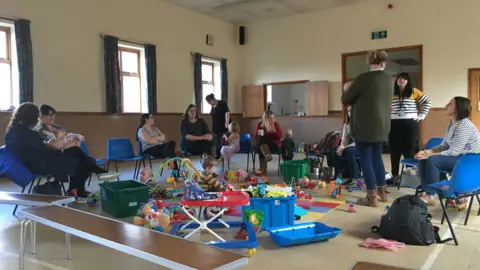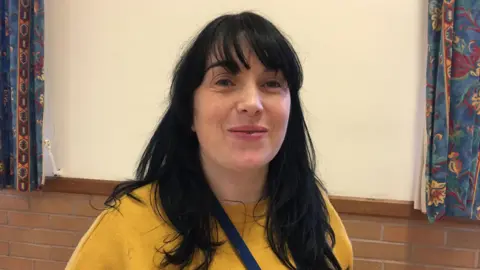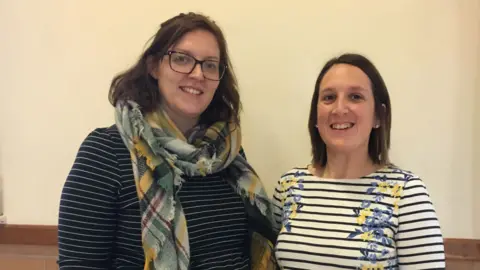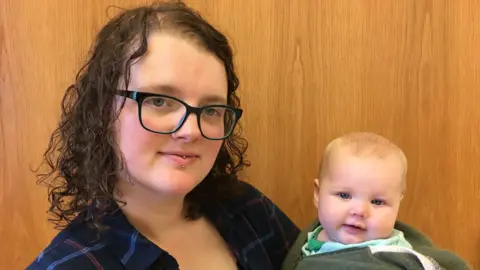Mothers band together to run mental health support group
"About 12 months ago, I tried to take my own life."
The blunt words from a young mother whose two small children play nearby are hard to reconcile with the smiling, friendly, welcoming woman saying them.
She has joined a group of mothers who have banded together to help each other in an area of Wales criticised for poor mental health service provision.
Bethany Casey did not leave her home for six months after her 16-month-old son was born, could not speak to people, felt utterly alone at her home in rural Powys, near the Wales-England border.
Now the 24-year-old former nursery worker from Norton, near Knighton, feels her life has been turned around by a mental health programme which targets women just like her.
Mums Matter, run by Mind Cymru, offers help to women who suffer mental health problems after becoming mothers.
The six-week programme, running in Powys until March 2019, looks at preconceptions of motherhood versus the realities, self-confidence, nurturing oneself and taking control of one's own recovery, among other things.
But the course was only the beginning. After the first one finished, two participants set up a Mums Matter peer support group to enable the first graduates to meet and continue the recovery the course had helped them begin.

The most recent meeting at a community hall in the tiny village of Dolau, near Llandrindod Wells, marks Bethany's first attendance after finishing the Mind Cymru course.
With her she has her three-year-old son, who has a number of health issues including partial sight, hearing loss and developmental delay, and her younger son.
Bethany has suffered from "all sorts of mental health issues" in the past, including depression. Speaking about her suicide attempt, she said: "I just didn't feel like I had anybody.
"The thing about having children is how isolating I find it.
"This group [has] encouraged me, they have given me the confidence to stand up for myself, and I can talk, because for a long time I didn't want to talk. I barricaded myself in my own house for about six months after my second child was born.
"If you are having a really rough day, and you don't feel like playing with your children, these mums will reassure you that it's ok to feel like that.
"It's given me confidence to talk to new people and it's been really nice to find other people who don't look at you or your child like you're bonkers."

Loneliness in motherhood is a repeated theme among the participants, exacerbated possibly by the rural area they live in. A report into maternity-related mental health in Wales noted that Powys was the only one of seven health boards across Wales which did not have a dedicated perinatal mental health service.
The Maternal Mental Health Alliance published a map of services across Wales, marking Powys as red because of a lack of specialist maternal mental health services.
Women at the support group must have completed the Mums Matter course and had a child, to do the course, as parts of it look at birth trauma and the organisers do not want to cause distress to first-time pregnant women.
Organisations offering such things as financial advice or health services also come to speak to the women.
The course is run by Mind Cymru's Tracy Lewis, who said: "We're only just starting to get better with the stigma. Mums are frightened to say anything sometimes because they think 'they're going to take my baby away'.
"It's getting mums to understand how common it is to struggle.
"People tell me they've lost themselves. It's reminding mums that they can take time for themselves."
She provides assistance to the support group and attends some meetings but is clear that it functions because of the women themselves.

Stacey Powell, 28, from Abbeycwmhir near Llandrindod Wells, coped well after her first child Nerys but things were very different following the birth of 18-month-old Ffion.
"Ffion was five weeks old and the health visitor noticed I was struggling with my second," she said.
"I had a history of depression and anxiety as a teenager. My health visitor referred me to Tracy and I had my first meeting with her that day."
The group "made a huge difference" to her, helping her gain techniques to manage anxiety and "irrational fears about going out on my own".
When the course finished, she and fellow graduate Nikki Jones, 31, from Builth Wells, felt they needed to continue the good work the course had begun.
"Nikki said to me, why don't we create a peer support group, because the whole point of Mums Matter is we take the tools to recover, but we're not cured in six weeks," said Stacey.
"It was just the six of us from the first group in the beginning, and it's grown as more groups [from subsequent courses] have come along. It's spread across the county."
Although the group might look like a regular playgroup to a casual observer, the difference was striking. Members are able to talk honestly about the "taboo", as she puts it, of the negative side of becoming a parent.
No-one bats an eyelid if a group member needs a cry during the meeting and there is none of the sense of presenting a particular face to the world that she feels can be the case in regular playgroups she has attended in the past.
"We wanted to create a group where the outside didn't need to be said. We have already been through the course, where you tell the truth about motherhood.
"We have all had that day where we're struggling. It's a safe space where we all come together. I'm definitely a lot stronger as a person."

As a result of her experiences, Stacey recovered from her post-natal depression and become a volunteer with Mums Matter.
A second peer support group "to combat loneliness" is now in the pipeline further north for Knighton and the area.
Stacey said: "The first time I did a group I felt like a fraud, She [Tracy] said 'you had to remember you have been in that place'. I could see the pain in the other ladies and I came through, so I can say 'you will come through it'.
"Coming here to this programme has enabled me to get from a place where I wasn't enjoying my children to 'I'm not perfect a lot of the time but I'm trying my best', and that's fine.
"I'm a stay-at-home mum, so if I'm not enjoying them, it's a bit of a black hole to be in. I was barely surviving and now I'm thriving."

Information and advice
If you or someone you know is struggling with issues raised by this story, find support through BBC Action Line .

